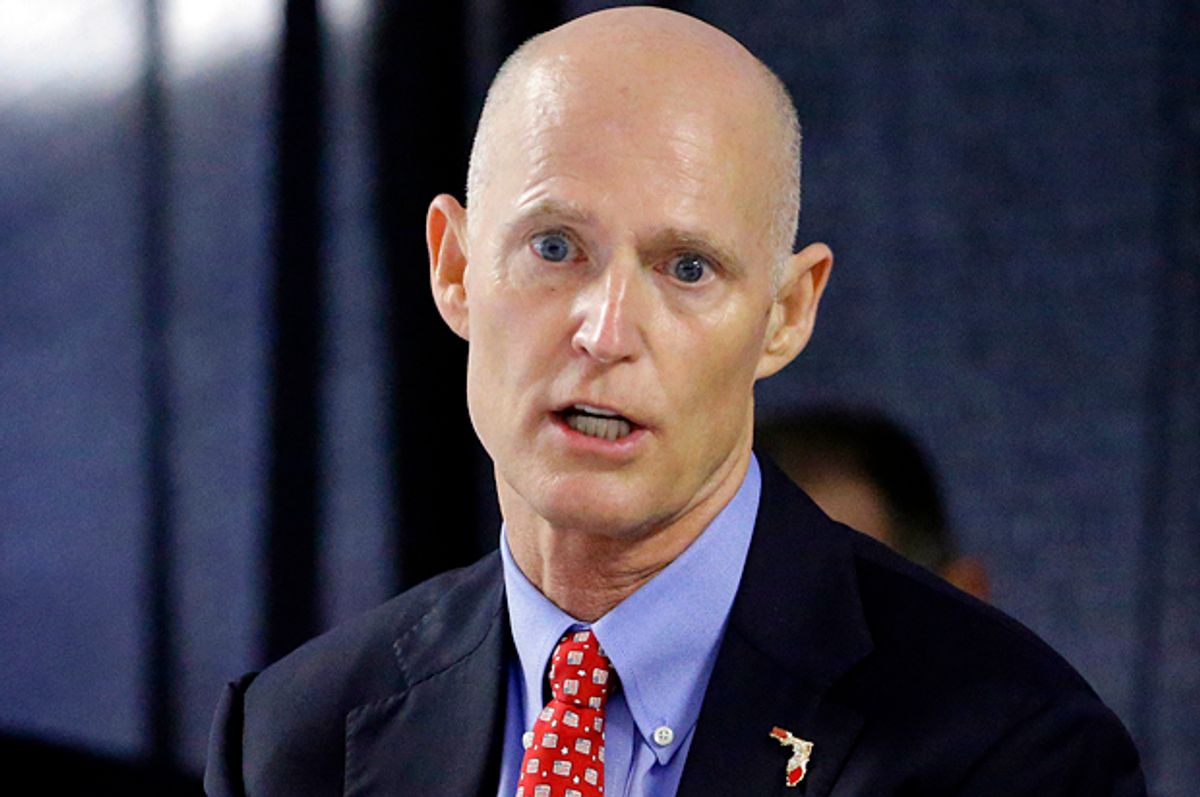As rising seas lap at its shore, Florida's come up with a fool-proof plan for dealing with climate change: an official policy of ignoring the problem and hoping it will go away.
For officials at the Florida Department of Environmental Protection, the agency ostensibly in charge in studying and preparing for the impacts of climate change, the term "climate change" itself, along with its counterpart "global warming," is reportedly verboten. That's according to a damning new report from the Florida Center for Investigative Reporting, published this weekend in the Miami Herald.
Former DEP employees claim they were told never to use either of those terms "in any official communications, emails or reports," because, said former Miami-based employee Kristina Trotta, “We were told that we were not allowed to discuss anything that was not a true fact."
The rationale sounds awfully familiar to Gov. Rick "I'm not a scientist" Scott, who refused to acknowledge the reality of man-made climate change even after a group of Florida scientists sat him down and explained it to him. According to the report, in fact, the climate change ban went into effect after Scott took office in 2011. Neither of the men who served as DEP director during Scott's time in office would comment for the article; the department’s press secretary, Tiffany Cowie, denied the existence of any such policy.
While there may not have been an official ban on the books, however, the report's sources say the spoken policy was widely communicated throughout the state -- they also say they were warned that, should they use the forbidden terms, it would bring "unwanted attention" to their projects. More tha just an annoyance, they claim it negatively affected their ability to do their jobs. “We were dealing with the effects and economic impact of climate change," one anonymous source said, "and yet we can’t reference it." In one emblematic example, nature writer Jim Harper describes the Monty Python-esque experience of attempting to write a report on coral reef protection in 2013:
He had a contract to write a series of educational fact sheets about how to protect the coral reefs north of Miami. Climate change was one of the issues Harper and his partner on the project, Annie Reisewitz, wanted to address.
“We were told not to use the term climate change,” Harper said. “The employees were so skittish they wouldn’t even talk about it.”
...
A year later, in November 2014, the Coral Reef Conservation Program held a meeting to train volunteers to use a PowerPoint presentation about the threats coral reefs faced. Harper attended the meeting, held at DEP’s Biscayne Bay office in Miami. Doug Young, president of the South Florida Audubon Society and a member of the Broward County Climate Change Task Force, also attended.
Two DEP employees, Ana Zangroniz and Kristina Trotta, showed the presentation to the volunteers and then asked if anyone had a question.
“I told them the biggest problem I have was that there was absolutely no mention of climate change and the affect of climate change on coral reefs,” Young said.
He continued: “The two young women, really good people, said, ‘We are not allowed to show the words, or show any slides that depicted anything related to climate change.’”
Young and Harper said they could not participate if climate change was not mentioned. “The women kept saying, ‘Work with us; we know you are frustrated,’” Harper said.
Trotta, who left her position in January, claims she was following orders.
If there's any place that really needs to be paying heed to the threats of climate change, it's Florida, which could lose 30 percent of its beaches by the end of the century due to sea-level rise (another term not welcome at the agency -- Trotta says they preferred the term "nuisance flooding"). With officials' heads buried this deep in the sand, South Miami, which got so fed up with government inaction last fall that it threatened to secede from the northern half of the state, may have had the right idea.

Shares